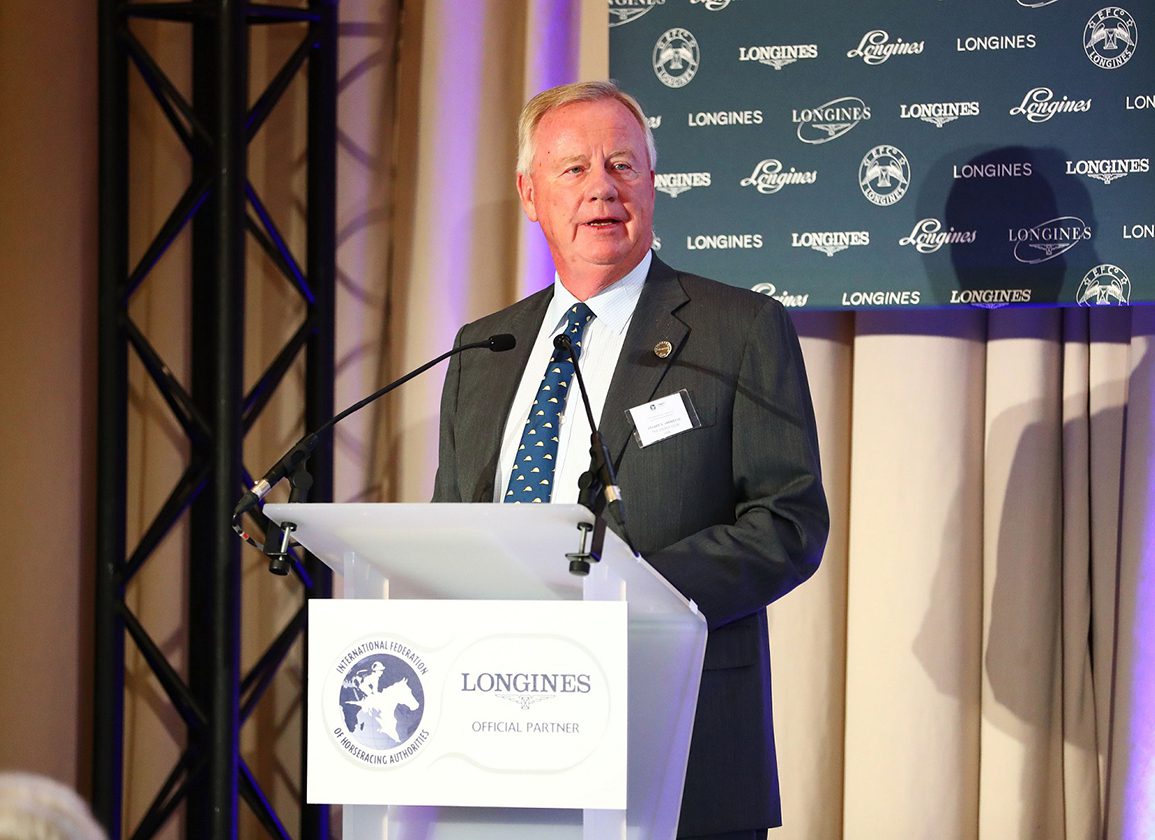By Bill Finley
The 56th International Federation of Horseracing Authorities (IFHA) Conference was held Monday in Paris and the focus was on key challenges and opportunities, including the issues of integrity and fan engagement, facing the industry around the globe.
“Integrity lies at the foundation of our sport and must inform every decision that we make,” said IFHA Chair Winfried Engelbrecht-Bresges. “The pandemic has inherently changed the way that fans and punters enjoy and participate in horse racing. A good digital customer experience is key, and the general trend of digital evolution further emphasizes that all industry players need to adapt quickly to emerging technologies and behaviors.”
The conference also featured an address by Jockey Club Chairman Stuart Janney. Janney was among delegates from 40 different countries.
Janney used his opportunity to update the delegates on the Horse Racing Integrity and Safety Act (HISA), the advancements the sport has made in recent years in the U.S. and the challenges it will face in the years ahead.
Janney said that if HISA had not been passed into law, the sport in the U.S. faced a perilous future. Lisa Lazarus, CEO of HISA, also provided the attendees with an overview of the establishment and work of HISA, its current challenges, and its future plans.
“There was no certainty of success,” Janney said of the chances the bill would be passed. “But we did know that the state-by-
state regulatory process in the United States was a failure, and with our partners in support of the bill, including Breeders' Cup and the IFHA, we needed a dramatic change if the sport was to be sustainable.”
Still, Janney was clear that the sport in the U.S. still has its problems and that its long-term success depends on viable solutions to those issues.
“Things will still have to change for American racing–and perhaps for all of us–as challenges remain,” Janney said.
He touched upon several issues, including changing attitudes regarding animal welfare.
“First off, the urbanization of America means four out of five people now live in densely populated communities, which means that fewer and fewer people are directly familiar with farming and livestock,” he said. “As a result, we've seen matters of animal welfare become policy drivers for important parts of our governments as well as lead stories in mainstream media. And beyond America, we see the same in many other corners of the world: how well we treat our equine competitors will become an important component for the growth and popularity of Thoroughbred racing.”
Other issues he raised included the Jockey Club's mission to ensure the integrity of the breed, and his comments touched upon his group's desire to maintain diversity in the breed.
“There is no doubt that there has been a narrowing of the genetic profile of many of the horses in our stud books, and we need to study the effects of these practices and consider remedies,” he said.
Noting the high-profile arrests in March of 2020 that came after an FBI investigation into doping in the sport, Janney said the industry must continue to be rigorous in its efforts to catch the cheats.
“With what is at stake in purses, betting pools and in the sales ring, collective actions to prevent crimes like these must be a top priority,” he said. “To that end, the American Jockey Club will continue to use our human and financial resources to protect the integrity of the game and to grow the sport. And we enthusiastically support the work of HISA, which we believe will help the sport in America…”
Despite his concerns, Janney said he believes the are plenty of reasons for optimism when it comes to U.S. racing.
“In a lot of ways, American racing is very much on the upswing and again leading the world in many important measurements,” he said.
Those measurements, he said, include rising handle totals, expanded TV coverage, booming horse sales and the ever-increasing popularity of meets like Del Mar and Saratoga and the major events like the Triple Crown races and the Breeders' Cup.
Following a discussion of HISA, several experts were interviewed on the subject of fan engagement. Tony Parker, the former NBA star who has become a prominent Classic-winning Thoroughbred owner in his native France, said racing needed to convey a message that it is not just a sport for the wealthy.
“Everyone, the vision they have of horse racing is that it's for billionaires,” said Parker. “They think normal people can't come into the horse world. It really is the total opposite. How can we change that image and get everyone involved? Use social media and try to do different stuff. I want to bring something different and try to make it more fun for younger people for people to come and watch horse racing.
“My friends, because I am on social media, they are like, 'Okay, how do you go into this world?' If you are worried about it or you think it's too much money, just start with 5%. Go slow and you can learn the horse world. We have to do a lot more if we want a bigger audience. You have to go to them and promote it.”
Near the end of the conference, Carly Dixon, Executive General Manager, Stakeholder, Customer & Corporate Affairs, Racing Victoria, presented on the upcoming 39th Asian Racing Conference (ARC), which will be held in Melbourne in February 2023.
Not a subscriber? Click here to sign up for the daily PDF or alerts.






